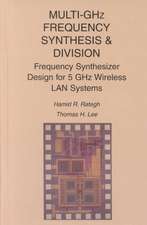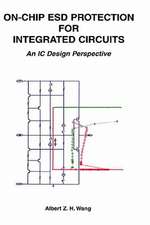Leaf Cell and Hierarchical Compaction Techniques: The Springer International Series in Engineering and Computer Science, cartea 407
Autor Cyrus Bamji, Ravi Varadarajanen Limba Engleză Paperback – 8 oct 2012
The focus of Leaf Cell and Hierarchical Compaction Techniques is three-fold. First, new ideas for compaction of leaf cells are presented. These cells can range from small transistor-level layouts to very large layouts generated by automatic Place and Route tools. Second, new approaches for hierarchical pitchmatching compaction are described and the concept of a Minimum Design is introduced. The system for hierarchical compaction is built on top of the leaf cell compaction engine and uses the algorithms implemented for leaf cell compaction in a modular fashion. Third, a new representation for designs called Virtual Interface, which allows for efficient topological specification and representation of hierarchical layouts, is outlined. The Virtual Interface representation binds all of the algorithms and their implementations for leaf and hierarchical compaction into an intuitive and easy-to-use system.
From the Foreword:
`...In this book, the authors provide a comprehensive approach to compaction based on carefully conceived abstractions. They describe the design of algorithms that provide true hierarchical compaction based on linear programming, but cut down the complexity of the computations through introduction of innovative representations that capture the provably minimum amount of required information needed for correct compaction. In most compaction algorithms, the complexity goes up with the number of design objects, but in this approach, complexity is due to the irregularity of the design, and hence is often tractable for most designs which incorporate substantial regularity.
Here the reader will find an elegant treatment of the many challenges ofcompaction, and a clear conceptual focus that provides a unified approach to all aspects of the compaction task...'
Jonathan Allen, Massachusetts Institute of Technology
| Toate formatele și edițiile | Preț | Express |
|---|---|---|
| Paperback (1) | 634.68 lei 43-57 zile | |
| Springer Us – 8 oct 2012 | 634.68 lei 43-57 zile | |
| Hardback (1) | 640.88 lei 43-57 zile | |
| Springer Us – 31 mai 1997 | 640.88 lei 43-57 zile |
Din seria The Springer International Series in Engineering and Computer Science
- 24%
 Preț: 1041.98 lei
Preț: 1041.98 lei - 20%
 Preț: 643.50 lei
Preț: 643.50 lei - 18%
 Preț: 1225.62 lei
Preț: 1225.62 lei - 18%
 Preț: 965.02 lei
Preț: 965.02 lei - 20%
 Preț: 646.12 lei
Preț: 646.12 lei - 18%
 Preț: 948.79 lei
Preț: 948.79 lei - 20%
 Preț: 646.62 lei
Preț: 646.62 lei - 15%
 Preț: 637.46 lei
Preț: 637.46 lei - 20%
 Preț: 643.83 lei
Preț: 643.83 lei - 18%
 Preț: 949.23 lei
Preț: 949.23 lei - 20%
 Preț: 644.48 lei
Preț: 644.48 lei - 20%
 Preț: 994.92 lei
Preț: 994.92 lei - 20%
 Preț: 645.97 lei
Preț: 645.97 lei - 18%
 Preț: 946.87 lei
Preț: 946.87 lei - 20%
 Preț: 995.57 lei
Preț: 995.57 lei - 18%
 Preț: 956.99 lei
Preț: 956.99 lei - 20%
 Preț: 644.98 lei
Preț: 644.98 lei - 15%
 Preț: 649.54 lei
Preț: 649.54 lei - 18%
 Preț: 950.21 lei
Preț: 950.21 lei - 18%
 Preț: 1221.38 lei
Preț: 1221.38 lei - 18%
 Preț: 957.62 lei
Preț: 957.62 lei - 15%
 Preț: 643.99 lei
Preț: 643.99 lei - 18%
 Preț: 948.47 lei
Preț: 948.47 lei - 18%
 Preț: 947.35 lei
Preț: 947.35 lei - 20%
 Preț: 1284.65 lei
Preț: 1284.65 lei - 20%
 Preț: 1628.31 lei
Preț: 1628.31 lei - 20%
 Preț: 1285.78 lei
Preț: 1285.78 lei
Preț: 634.68 lei
Preț vechi: 746.69 lei
-15% Nou
Puncte Express: 952
Preț estimativ în valută:
121.48€ • 132.00$ • 102.11£
121.48€ • 132.00$ • 102.11£
Carte tipărită la comandă
Livrare economică 21 aprilie-05 mai
Preluare comenzi: 021 569.72.76
Specificații
ISBN-13: 9781461378136
ISBN-10: 1461378133
Pagini: 180
Ilustrații: XIV, 161 p.
Dimensiuni: 155 x 235 x 9 mm
Greutate: 0.26 kg
Ediția:Softcover reprint of the original 1st ed. 1997
Editura: Springer Us
Colecția Springer
Seria The Springer International Series in Engineering and Computer Science
Locul publicării:New York, NY, United States
ISBN-10: 1461378133
Pagini: 180
Ilustrații: XIV, 161 p.
Dimensiuni: 155 x 235 x 9 mm
Greutate: 0.26 kg
Ediția:Softcover reprint of the original 1st ed. 1997
Editura: Springer Us
Colecția Springer
Seria The Springer International Series in Engineering and Computer Science
Locul publicării:New York, NY, United States
Public țintă
ResearchCuprins
1 Introduction.- 1.1 Compaction.- 1.2 Applications of Compaction.- 1.3 Outline of the Book.- 2 Leaf Cell Compaction.- 2.1 Introduction.- 2.2 Survey of Leaf Cell Compaction.- 2.3 Graph Based Compaction.- 2.4 Scanline Generators.- 2.5 Net Extraction.- 2.6 Constraint Generation.- 2.7 Graph Solution.- 2.8 Wire Length Minimization.- 2.9 Automatic Jogging of Wires.- 2.10 Enhanced Network Flow Algorithm.- 2.11 Yield Optimization.- 3 Hierarchical Compaction.- 3.1 Overview.- 3.2 Formulation of the Hierarchical Compaction Problem.- 3.3 Hierarchical Pitchmatching Compaction.- 4 Hierarchical Pitchmatching Compaction using Minimum Design.- 4.1 Overview.- 4.2 Hierarchy Normalization.- 4.3 Minimum Design.- 4.4 Over the Cell Routing.- 4.5 Reporting Overconstraints in Hierarchical Compaction.- 4.6 Results.- 5 Virtual Interface.- 5.1 Overview.- 5.2 Introduction to Virtual Interface.- 5.3 Virtual Interface Representation.- 5.4 Example of Virtual Interface.- 6 Conclusion.- References.


















